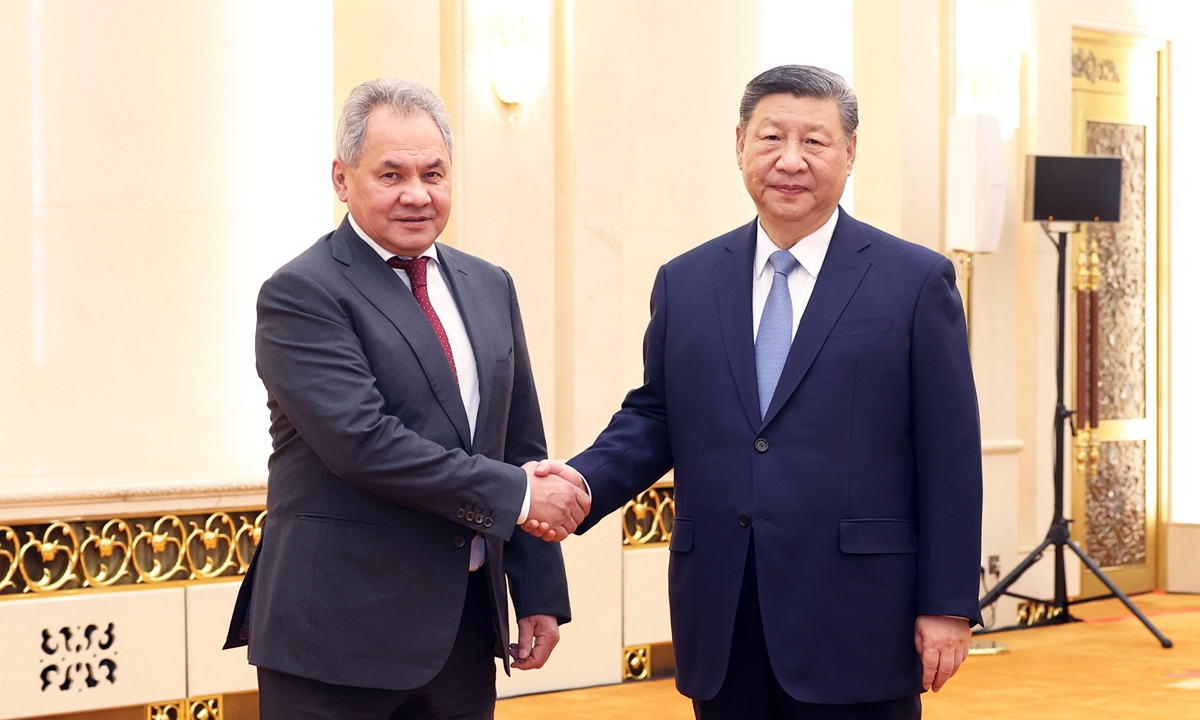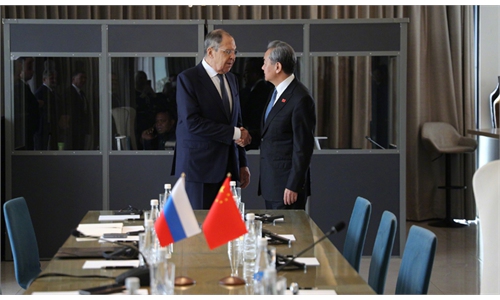Xi meets Shoigu in Beijing, calls for enhanced strategic coordination
Visit reflects high level of strategic mutual trust, crucial to global strategic stability: expert

Chinese President Xi Jinping meets with Sergei Shoigu, secretary of the Russian Federation Security Council, at the Great Hall of the People in Beijing, capital of China, Feb. 28, 2025. Photo: Xinhua
Chinese President Xi Jinping met with Sergei Shoigu, secretary of the Russian Federation Security Council, in Beijing on Friday. Analysts view the meeting and visit as demonstrating a high level of strategic mutual trust between China and Russia, which is of great significance to global strategic stability, especially in an increasingly complex geopolitical landscape.
Noting that China and Russia are friendly neighbors and true friends, Xi said he and President Vladimir Putin have communicated twice this year, making overarching plans for the development of China-Russia relations and having in-depth exchanges on a series of major international and regional issues, according to the Xinhua News Agency.
He said the two sides should maintain close communication at all levels to fully implement the consensus reached between the two heads of state and promote permanent good-neighborliness and friendship, comprehensive strategic coordination and mutually beneficial cooperation between the two countries.
Shoigu conveyed President Putin's cordial greetings to President Xi, saying that President Putin highly values the sincere friendship and close contact with President Xi.
The relations between Russia and China have reached an unprecedented high level and do not target any third party, Shoigu said, according to Xinhua.
Chinese Foreign Minister Wang Yi also held a strategic dialogue with Shoigu on Friday. Wang noted that under the strategic guidance of the two heads of state, China-Russia relations will continue to remain rock-solid and unshakable, per Xinhua.
High-level mutual trust
Shoigu's visit came on the heels of a phone conversation between President Xi and Russian President Vladimir Putin on February 24. According to Russian news agency Tass, Shoigu's trip to Beijing marks his second visit to China in the past three months.
Responding to a question about media reports that Russian Security Council Secretary Sergei Shoigu arrived in Beijing on Friday for talks with the Chinese side, Chinese Foreign Ministry spokesperson Lin Jian said on Friday that as comprehensive strategic partners of coordination in the new era, China and Russia have maintained close high-level exchanges.
Li Haidong, a professor at China Foreign Affairs University, told the Global Times that Shoigu's visit reflects the high level of strategic mutual trust and transparency in developing relations between China and Russia.
Against the backdrop of uncertainty in the Ukraine crisis, as well as significant adjustments in the geopolitical landscape - such as in US-Russia relations, US-Europe relations, and Ukraine-US relations - Shoigu's visit is a substantive action taken by China and Russia to further strengthen the foundation of their strategic coordination, which plays a significant role in advancing strategic communication and interaction between the two sides on international issues, Li said.
Shoigu's visit came a day after a six-hour meeting between US and Russian delegations on bilateral issues at the US Consulate General in Istanbul on Thursday, without a statement to the press.
According to Xinhua, Shoigu briefed Wang on the latest developments in Russia-US contacts and Russia's considerations regarding its stance, stating that Russia is committed to addressing the root causes of the Ukraine crisis and seeking a permanent, fair, and sustainable peace solution.
Wang expressed that China will continue to play a constructive role in promoting peace and dialogue, facilitating a political resolution to the Ukraine crisis. Both sides agreed to hold a new round of China-Russia strategic security consultations at an appropriate time, Xinhua reported.
Zhang Hong, a research fellow at the Institute of Russian, Eastern European and Central Asian Studies of the Chinese Academy of Social Sciences said that the timely alignment of positions between China and Russia following significant events reflects their strategic coordination, which aligns with established precedent.
"The China-Russia relationship is not merely about bilateral affairs, and it constitutes a critical set of major power dynamics that bear on global strategic stability," Li said, "Therefore, the prompt mutual calibration of stances between China and Russia in the wake of significant events is of utmost importance."
Evolving dynamics
As Shoigu kicked off his visit to Beijing, in the Western Hemisphere, US President Donald Trump is scheduled to meet the visiting Ukrainian President Volodymyr Zelensky on Friday morning local time in Washington DC, as the two sides are expected to sign a deal granting the US access to Ukraine's rare minerals.
Before the high-stakes talks in Washington, the Washington Post said in a Wednesday report that President Trump and President Zelensky "offered differing expectations" for the meeting, as the Ukrainian leader underscored his need for American assurances about Kiev's future security while the US president stressed the benefits of a deal to reap Ukraine's vast mineral wealth.
The BBC also noted the differences in how both sides described the deal. Trump has lauded the "very big agreement" as an opportunity for the US to get its "money back" after funding aid to Ukraine. But Zelensky has instead referred to it as a "framework agreement" upon which he hopes further deals can be made, the BBC said.
From draft texts of the agreement disclosed in advance, it is evident that this mineral deal is primarily focused on Ukraine's post-war reconstruction, said Zhang, "Judging by the outcomes of recent visits to the US by British and French leaders, Trump's stance on Ukraine's security issues remains uncompromising."
On Wednesday, Trump said that if there are to be any such promises, they will have to come from Europe, with little backup from Washington, per the New York Times.
"It suggests that Ukraine's core demands are unlikely to be met in the deal, and its recent efforts are represented as a final diplomatic push," said Zhang.
The signing of the minerals deal is largely a concession by Ukraine to prevent a rupture in ties with the US, but it would be unlikely to fundamentally alter Trump's policy toward the Ukraine crisis - namely, no troop deployments, no financial commitments, and no assumption of direct responsibility for Ukraine's security, said Zhang.


